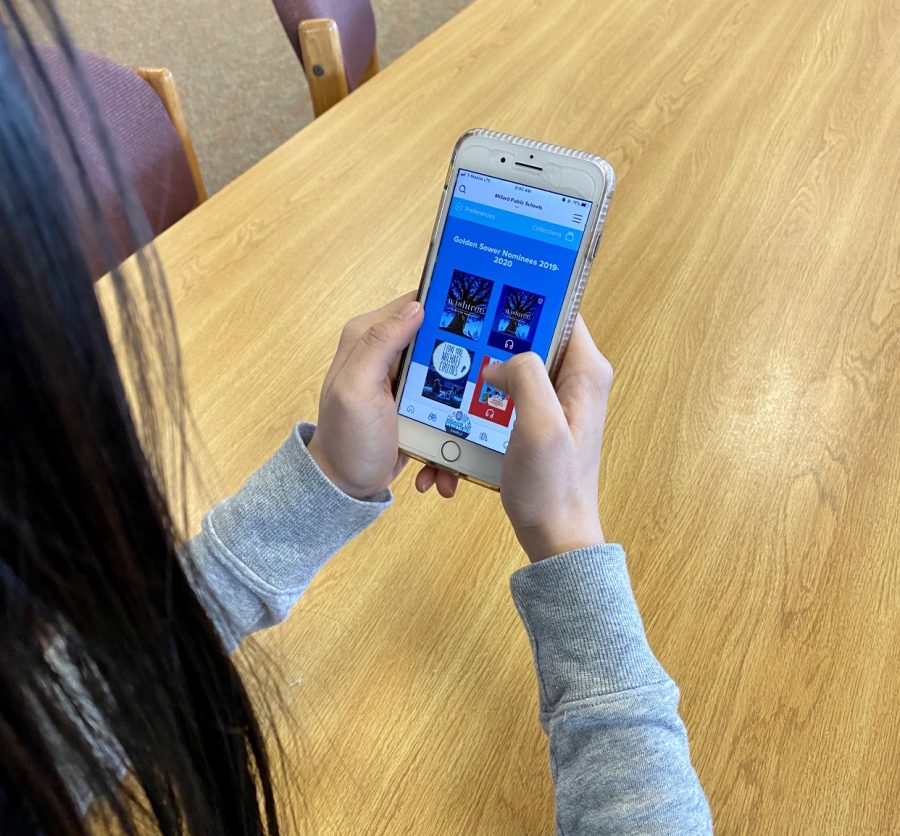Going Digital
Millard West library adopts e-books and audiobooks
A student browses for e-books on the Sora by Overdrive app. The school started working with the Overdrive company last year and has been trying to let people know about it. “We have it on the announcements, we have signs around, we’re tweeting about it and just trying to do what we can to get the word out,” said librarian Mindy Longe.
November 1, 2019
Students have plenty of excuses to avoid reading. From not having time to go to the library, not wanting to lose their book or not knowing what title to check out, there are countless obstacles for the modern-day reader. Schools across the country have found a solution to this issue: electronic books. As reported by the School Library Journal, around two-thirds of libraries have adopted digital books and Millard West is joining in on the trend.
Millard’s journey with digital reading began long before the present-day e-books became popular. The district has been using audiobooks on tapes and CDs for years, but recently transitioned to e-books and audiobooks that can be accessed through phones and tablets. Anyone who has access to Millard school libraries can use them.
“We just want kids to have access to books no matter how that is,” librarian Mindy Longe said. “This makes us available 365 days a year, 24/7 and it really helps with accessibility”
The books can be accessed through an app called Sora by Overdrive on any personal device. They can be used online or offline at any time of day or year and sync between devices. All you have to do is download the app, search and select ‘Millard Public Schools’ and log in with your student ID. From there, students and staff have access to over 1300 e-books and more than 500 audiobooks. Users can choose to search for a title, author or browse different categories. The range of genres spans from romance to science fiction.
Much like with actual libraries, the digital library allows readers to check out a book for two weeks at a time. Once that time is up, the book automatically disappears from your account which curbs the threat of lost or overdue books. Titles can be returned early or renewed if needed and can also be put on hold so they are automatically checked out to the user’s account once available.
“It’s helpful because when checking out a book from the library you have to return it on time, but with the app, you can return it with one click and check out books really easily,” senior Ojaswee Sapkota said. “It lets you see what’s available now and you can put books on hold if they’re not available.”
The digital library also offers features that normal libraries cannot. For example, app users can see individual stats such as the total time spent reading, total books opened, average time per book and the reader’s current streak. The app allows readers to highlight, take notes and define unfamiliar words. With audiobooks, the app provides a sample so readers can decide if they like the way a book is read before checking it out. These functions are part of the reason why librarians are hopeful about the benefits of these e-books for more hesitant readers.
“It can help readers who have a hard time with fluency,” Longe said. “If they can listen to somebody else reading the story, they get more out of it.”
The e-books and audiobooks have proven successful so far. However, students and staff have mixed feelings about how they compare to print books. Some prefer to stick with traditional print books whereas others find that e-books are more convenient.
“I love audiobooks personally, my husband and I listen to them every time we travel,” library para Missy Collins said. “They help you pass the time and listen to stories you wouldn’t normally read.”
Make sure to check out the books on Sora and talk to the library staff for more information.







